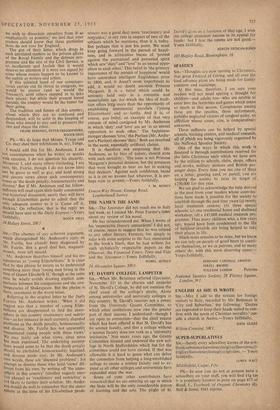SIR,---The absence of any coherent argument, which distinguished Mr. Anderson's
reply to Mr'. Fairlie, has already been diagnosed by Mr. Fairlie. But a good deal has, magnani- mously, been left unsaid.
Mr. Anderson describes himself and his co- signatories as 'young Elizabethans' It is clear that by this phrase he means us to understand something more than 'young men living in the time of Queen Elizabeth IL' though at the same time he wisely avoids drawing explicit com- parisons between his companions and the con- teinPoraries of Shakespeare. But the phrase is there, emotional in the worst sense.
Referring to the original letter to the Daily l':xPress Mr. Anderson writes : 'What it did suggest was that a number of young Eliza- bethans are disappointed to find the atmo- sPhere in this country reactionary and restric- tive—as for instance in such currently disputed Problems as the death penalty, homosexuality and divorce. Mr. Fairlie has not apparently encountered young people with these views.' \V, e may fairly ask what views, since none has been expressed. The underlying assump- tions would seento be that the death penalty should he abolished, homosexuality legalised, and divorce made easy. In Mr. Anderson's own words, these are 'disputed problems' : his attempt to dismiss those who hold 'views' dif- ferent from his own, by writing off 'the atmo- 'Acre in this country' (another vaguely emo- tive phrase) as 'reactionary and restrictive' is not likely to further their solution. Mr: Ander- son would do well to remember that the atmo- sphere at the time of his Elizabethan prede- ccssors was a good deal more 'reactionary and restrictive,' at any rate in respect of two of the subjects which he mentions, than it is today. But perhaps that is just his point. We must keep going forward in the pursuit of happi- ness, and in alliterative bursts of 'protest against the puritanical and perverted spirit which sets "duty" and "love" in an unreal oppo- sition to each other.' This belief in 'the primary importance of the pursuit of happiness' would have astonished intelligent Englishmen prior to 1800, and, it doesn't seem impertinent to add, it would no doubt astonish Princess Margaret. It is a belief which could be seriously held only in a romantic and materialistic age, for which the idea of tradi- tion offers little more than the opportunity of establishing sentimental parallels ('young Elizabethans' and so forth). And it is, of course, qua bad, an example of that very
• attitude of mind castigated by Mr. Anderson in which 'duty' and 'love' are set 'in an unreal opposition to each other.' The happiness- monger chooses 'love,' the Puritan (Mr. Ander- son's Puritan) chooses 'duty.' Both are involved in the same, essentially artificial, choice.
It is therefore not surprising that Mr. Anderson, as by bias of nature, should state with such certainty : 'The issue is not Princess Margaret's personal decision, but the pressures that were brought to bear on her in making that decision.' Against such confidence, based as it is on no known fact whatever, it is per- haps vain to protest.—Yours faithfully,
J. M. MONEY
Ermvn Way House, Grange Road, Leatherheaa' Surrey


























































 Previous page
Previous page